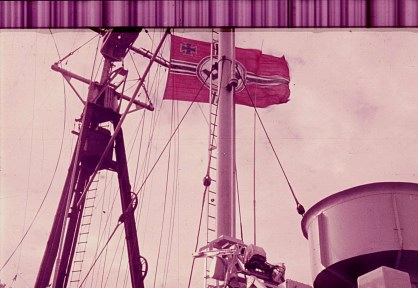Misc Film VistaVision
Click on photo to return
Very badly faded, through age, VistaVision frames with cement splice
Aspect Ratio 1:1.5
True VistaVision film ran through the projector from bottom to top, and the film was twisted to run through the gate horizontally
This was often called 'The Lazy Eight' as the film was lying on it's side
Film 'Battle of the River Plate'
VistaVision frame & variable density optical sound track
For projection on a normal type of 35mm projector, ie top to bottom, the film was matted to a standard aspect ratio and printed
optically to give a picture size of 24mm wide by 18mm high.
VistaVision films could be shown in a number of aspect ratios, the most popular being 1.85:1. Others included 2:1 and 1.75:1.
Framing for these ratios was always adjusted with special ratio lines printed at the start of each reel
UK projectionists called them Plimsoll Lines as they looked very similar to the marking on the side of a ship
Whereas most other widescreen film systems used a four track magnetic stereo sound system, VistaVision used
Perspecta Stereo
This was a pseudo stereo system as it used a mono sound track that had three low frequency signals encoded onto it along with
the audio track
The three signal tracks were 30hz, 35hz, and 40 hz
30hz sent the sound to the left speaker, 35hz to the centre speaker, and 40hz to the right speaker
This system of motion picture stereophonic sound was developed by the Fine Sound Laboratories Inc
It was introduced in 1954, and ended it's short life in 1957
Click on photo to return

